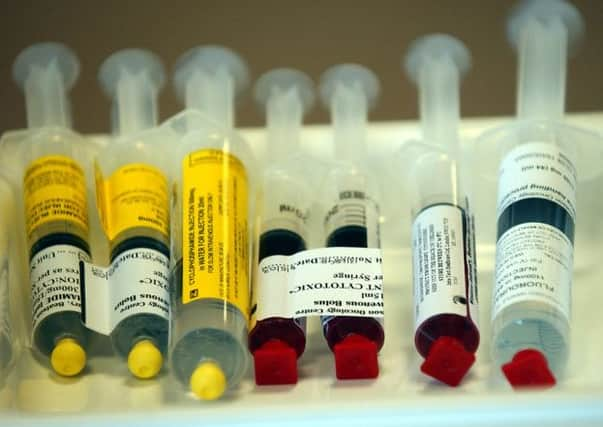Cancer patients ‘could beat disease with own cells’


Patients with the most dangerous form of skin cancer, malignant melanoma, will be the first to be given the treatment, which involves growing an army of billions of immune cells and sending them back inside the body to work against the disease.
It is hoped the treatment will be effective against a wide range of cancers, as well as other illnesses including flu and HIV.
Advertisement
Hide AdAdvertisement
Hide AdThe trials are being led by scientists based at the Scottish firm TC BioPharm, who have teamed up with researchers in Japan where the technology has been pioneered.
TC BioPharm, whose headquarters is in the Pentlands Science Park in Edinburgh, has created a specialist facility to process cells just outside Glasgow.
Michael Leek, a biologist and chief executive of TC BioPharm, believes the technique has the potential to significantly extend the life expectancy of cancer sufferers, particularly when used in combination with other treatments.
The technology – a type of immunotherapy – involves harnessing the anti-cancer properties of types of immune cells, or T-cells, known as gamma delta T-lymphocytes.
These cells are removed in a process called leukapheresis, where a line in a vein removes blood from the body. The specific T-cells are separated out and the rest of the blood cells and plasma returned into the other arm. The process takes about three to four hours and is the same as the technique used to remove cells from people donating to leukaemia patients who need a cell transplant.
Once removed from the patient, the T-cells are treated with a cocktail of chemicals in a special bag which encourages them to multiply in the sterile environment.
The T-cells are then cleaned of any remaining chemical before being infused back into the patients over six sessions as required.
“The idea is that you take the patient’s own cells to treat them,” Dr Leek said.
Advertisement
Hide AdAdvertisement
Hide Ad“We are not modifying them in any way. We are just expanding them.
“We may start off with a few million cells, but by the time we have finished expanding them, we will have several billion.”
When the cells are put back, the hope is that, in such huge numbers, they will set to work against the cancer cells more effectively than those naturally occurring in the body.”
After trials for melanoma, which will involve up to 500 patients in Glasgow, Southampton, Birmingham and London, Dr Leek said they hoped to move on to testing the technique in other cancers.
Dr Alan Worsley, Cancer Research UK senior science communications officer, said: “Finding new ways to boost the body’s immune system against cancer is essential, but this approach is still at a very early stage.
“It’s not yet clear how effective this cell therapy is at treating malignant melanoma and we will have to wait for the results of clinical trials to prove whether it can benefit cancer patients.”